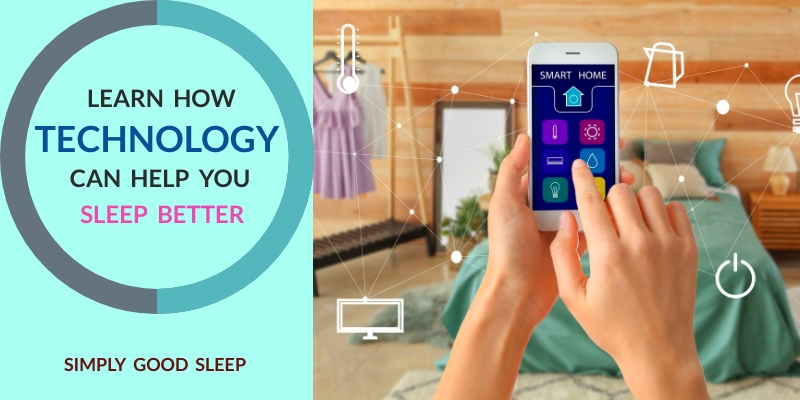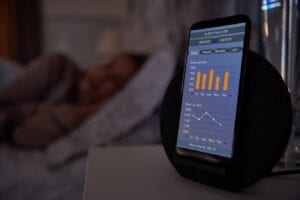
We’ve all heard stories about how technology gets in the way of sleep. How many times have you heard the advice to turn off your computer or phone up to an hour before going to bed?
While it’s true that some technology can make it more difficult to sleep, there’s technology out there that helps users to sleep better. There are countless products out there designed to make sleep more effective and easier.
There are a lot of sleep apps and external sleep monitors. There is wearable technology, like smart sleep masks and fitness trackers. That’s to say nothing of the devices designed to create the ideal sleep environment by regulating temperature, light, and noise. There are also tech solutions to problems, like snoring, and circadian rhythm problems.
Here are some of the ways you can leverage technology to sleep better at night.
Can Natural Sleep Be Enhanced?
Sleep is something that all animals across the world do naturally. Even plants have periods of rest that could be considered “sleep”. It’s a natural physiological process that we can’t get around. With that said, humans are the only animals that are interested in finding ways to improve sleep and make it better through the use of technology.
The idea of improving sleep through technology is not, by itself, a bad thing. Humans have used their rational minds for years to achieve what would normally be impossible. We don’t have wings, so we created machines that could fly, for example.
Technology has made it possible for us to do all the many wonderful things we are able to do today. It’s thanks to technology that you’re reading this right now!
There will always be a place for technology. It’s an important part of our lives now. It may even have a place in the bedroom and be able to help with improving sleep quality. Given how important sleep is, it’s one of those times when it’s not so bad for us to poke around and see how we can improve it.
Current Sleep Technology
-
Sleep Apps
Just load up the app store on your phone or tablet and you’ll see there are plenty of apps out there designed to improve sleep.
A lot of them are used to track sleep and wakefulness in particular. The information from these apps can be used to synchronize the ideal morning alarm for you.
Other sleep apps serve other purposes, such as apps that help you to relax or playing soothing music and sounds to help you drift off.
Others offer advice on how to prepare to sleep and get the most out of it. Many of these apps can be paired up to wearable devices and are created by the manufacturers of those devices.
-
Wearable Technology for Sleep
Fitness trackers, such as FitBit and Apple Watch, can be used to help with sleep. These devices were originally sold as being able to track steps and exercises, and have now developed to cover wellness as a whole.
They keep track of information such as movement data, heart rate, and blood oxygen levels to offer advice on how to sleep better at night. There are also special wearables designed for the bedroom, like smart sleep masks.
-
Smart Mattresses and Beds
With the Internet of Things (IoT) continuing to expand, it was only a matter of time before someone created smart beds (and mattresses). They work similar to wearables and collect information about the user, such as how long they sleep, temperature, blood pressure, heart rate, and the like.
These smart beds can be used to reduce sleep apnea and snoring too. Some are even able to regulate temperature to create the ideal sleeping environment. Smart mattresses can even heat up different areas of the mattress for couples that like different warmth levels in bed.
-
Anti-Snoring Pillows
On the same vein as smart mattresses and beds, there’s also been the recent advancement of smart anti-snoring pillows (and pillow devices). Anti-snoring pillows and pillow devices are designed to prevent snoring and reduce snoring severity.
One example of a pillow device is Smart Nora, which combines a ‘smart’ bedside sensor pebble microphone unit and an inflatable pillow insert. Throughout the night, the bedside unit listens for snoring, and uses bluetooth to send a signal to a pump which inflates/deflates the pillow insert to gently move the head to stop the snoring.
-
External Sleep Monitors
As the name suggests, external sleep monitors are designed to be placed on night stands and by beds.

These tools check the environment and collect information on things that could be preventing users from getting enough sleep at night. They work to correct these issues and have all kinds of features built in, such as playing soothing sleep sounds and temperature regulation.
A sleep specialist may be able to use the information from these devices to make recommendations and write prescriptions.
What is the Future for Sleep Technology?
Technology is always moving and evolving. One advancement for sleep technology is the advancement of telemedicine to manage sleep disorders.
Telemedicine would allow for certified sleep physicians to reach more people and help them. Imagine being able to have a physician help you from home without having to visit a hospital. That’s what telemedicine does.
There’s always the potential that artificial intelligence (AI) may offer up some answers on how to sleep better. Letting AI think over sleeping issues may lead to the development of better cognitive behavioral therapy (CBT) techniques and better access to those techniques.
Last Words
It seems like the world as a whole has a sleeping problem. That’s because modern society isn’t very friendly towards the idea of just stopping and doing nothing for eight hours.
Take back control of your sleep with technology and lifestyle changes that create a better sleeping environment for better sleep.

2 Responses
Had no idea smart mattresses existed like that. The heating element sounds so nice especially in the winter months or if your back is sore. I look forward to seeing where technology goes with sleep in the future!
We invite you to ‘stay tuned’ for future posts as we continue to bring you posts on sleep technology and its impact on the future of sleep!